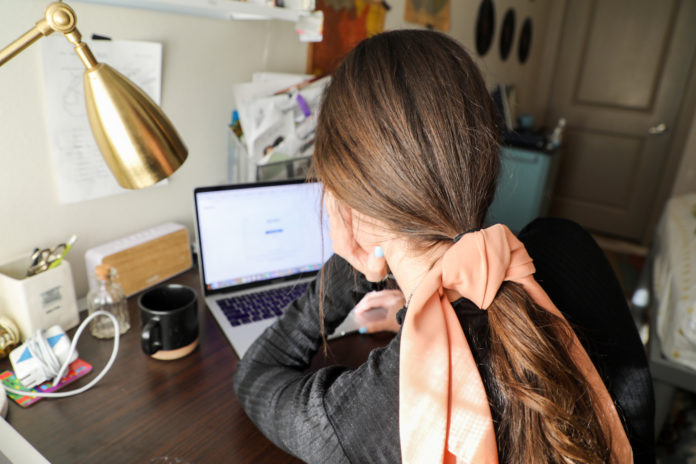
By Anne Walker | Staff Writer
While innovative technology allows Baylor students to protect themselves from COVID-19 as they complete courses, online and hybrid classes may pose other health risks.
Baylor students are finding themselves spending more time in front of their computer screens, which exposes them to increased levels of blue light.
Orlando, Fla., freshman Lily Weir recalled suffering from headaches after some of her courses went online this past semester. She attributed her symptoms to increased blue light exposure from spending more time on her laptop.
“When things moved online for school, I was really getting a lot of headaches and migraines because my screen time was up to eight hours a day. I was looking for a solution, and I thought blue light glasses might do the trick,” Weir said.
Dr. Leigh Anne Green, Baylor graduate and optometrist, reassured her concerned patients about blue light, writing on Green Eye Associates “blue light has been there for ages, and no one is blind from it.”
“Too much blue light tells our brain to stay awake, so especially in the evenings, blue light protection can help us feel sleepy at the right time,” Green said.
Green pointed out the potential benefits of blue light protection for individuals “who are generally light sensitive or are prone to headaches or seizures,” but concluded that she “wouldn’t recommend blue light filters for your glasses.”
“Especially not the zero prescription kind you get off the internet. They’re cute but not medically necessary,” Green said. “More UV blue light is in the actual sunshine than your computer screen.”
Students also attribute reduced physical activity to online classes.
“I feel like it tires you out more and makes you more sedentary because you’re not going to be walking to and from online classes, and then because you go straight from doing a class to doing work in the same space, it prevents movement,” Weir said.
Dr. Renee Umstattd Meyer, Robbins College associate dean for research and public health professor, expressed concern about the impact that online classes have on students’ health.
“I think that there’s been a concern pre-COVID about the amount of time our society spends in front of screens and in a more sedentary fashion than the way our bodies were designed but absolutely with the move towards more online [classes],” Umstattd Meyer said.
The National Library of Medicine asserts asserts that a sedentary lifestyle can lead to various chronic diseases, including heart diseases, Type 2 Diabetes and various cancers.
Umstattd Meyer offered hope to students who have schedules packed with Zoom classes.
“You can actually offset some of those risks by being more physically active, by doing more exercise,” Umstattd Meyer said. “You’re sitting down a whole lot more. You can do more than your 30-minute walk. You can walk for 45 minutes or 60 minutes.”
She pointed out that a lack of movement can not only affect individuals’ physical health but also their mental and emotional health.
“When we’re moving around more, we’re seeing more people, so there’s more social interactions, and so the social emotional health pieces I think are kind of an indirect part of the story,” Umstattd Meyer said. “We know the science definitely supports that physical activity and movement can help from a mental health standpoint.”
Umstattd Meyer recommended students take frequent breaks in between online classes or during long study sessions.
“Making yourself walk across the house or across the apartment,” Umstattd Meyer said. “That can really offset some of that sitting.”
The World Health Organization prescribes all adults a minimum of 150 to 300 minutes of “moderate to vigorous aerobic activity per week.”
“We don’t all have to go for a run to be physically active, so … figure out how you could maybe do things that bring you joy that also include movement,” Umstattd Meyer said.





